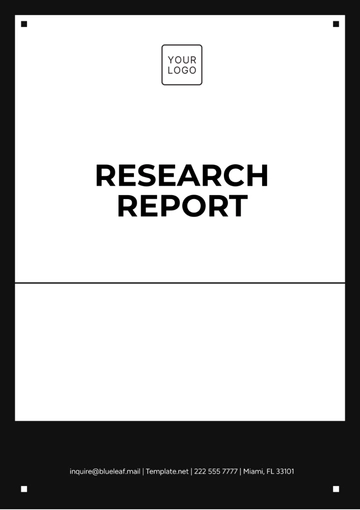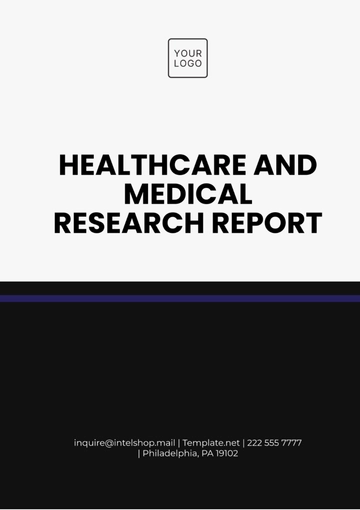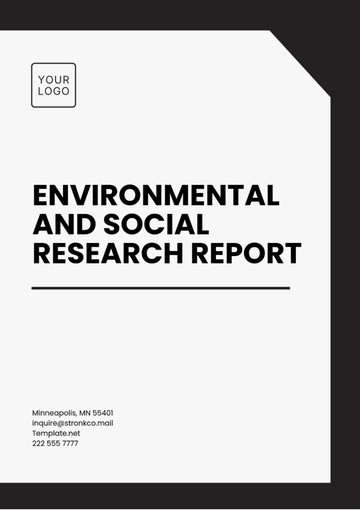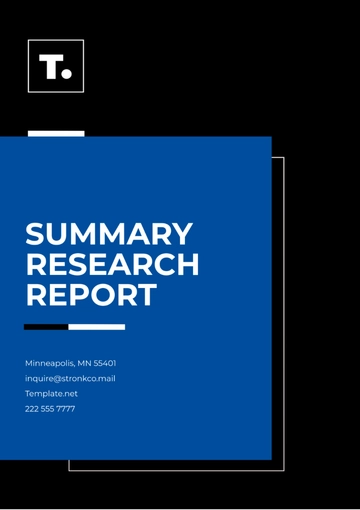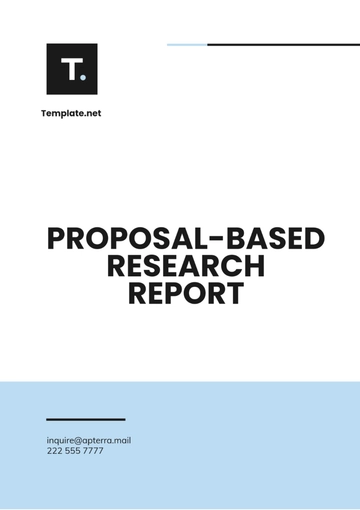Free Printable Research Report

I. Introduction
In recent decades, the global community has witnessed escalating concerns regarding climate change and its profound effects on marine ecosystems. This report aims to analyze the current state and projected impacts of climate change on marine biodiversity, focusing on key species and ecosystems crucial to oceanic health.
A. Background
Climate change, primarily driven by anthropogenic activities such as fossil fuel combustion and deforestation, has led to significant alterations in Earth's climate system. These changes manifest in rising global temperatures, altered precipitation patterns, and increased frequency of extreme weather events. In marine environments, these shifts have dire consequences, including rising sea levels, ocean acidification, and changes in ocean circulation patterns.
B. Objectives
The primary objectives of this study are:
To comprehensively assess documented impacts of climate change on marine biodiversity across different regions.
To identify and highlight vulnerable marine species and ecosystems that are particularly at risk.
To propose evidence-based mitigation strategies and policy recommendations aimed at preserving marine biodiversity amidst climate change challenges.
II. Methodology
This research employed a robust systematic review approach, integrating data from peer-reviewed scientific literature, reports from governmental and non-governmental organizations, and expert assessments. Both qualitative and quantitative methods were employed to analyze trends, impacts, and projections related to climate change effects on marine biodiversity.
A. Data Collection
Data sources included Ocean Conservancy, the National Oceanic and Atmospheric Administration (NOAA), the International Union for Conservation of Nature (IUCN), and other reputable organizations focused on marine conservation and climate science. Information was gathered from studies spanning multiple decades to capture long-term trends and recent developments.
B. Analysis
Quantitative analysis involves statistical techniques to analyze temperature trends, ocean acidification rates, and biodiversity indices. Qualitative analysis encompassed case studies and expert opinions to provide a contextual understanding of ecological shifts and species responses to environmental changes.
III. Results
The findings of this study highlight significant and concerning trends in marine biodiversity loss attributed to climate change impacts. Key results include:
Impact | Findings |
|---|---|
Rising Ocean Temperatures | Global average sea temperatures have increased by approximately 1.2 degrees Celsius since 2050, affecting thermal habitats critical for marine species. |
Ocean Acidification | Increased absorption of atmospheric carbon dioxide has led to a 20% rise in ocean acidity levels, threatening calcium carbonate-based organisms and food chains. |
Species Vulnerability | Species like the Pacific Salmon (Oncorhynchus spp.) and Antarctic krill (Euphausia superba) have exhibited population declines and shifts in distribution patterns. |
IV. Discussion
A. Implications
The observed impacts underscore the urgent need for immediate global action to mitigate climate change effects on marine biodiversity. These effects not only disrupt ecological balance but also jeopardize the livelihoods and food security of millions who depend on marine resources.
B. Recommendations
Based on the findings, the following recommendations are proposed:
Policy Initiatives: Enact and enforce stringent international agreements aimed at reducing greenhouse gas emissions, particularly from fossil fuel combustion and deforestation.
Sustainable Practices: Promote sustainable fisheries management practices and marine protected areas to safeguard critical habitats and breeding grounds.
Public Awareness: Increase public awareness campaigns on the importance of marine biodiversity conservation and the role of climate action in preserving ocean ecosystems.
V. Case Studies
This section presents relevant case studies that illustrate the specific impacts of climate change on marine biodiversity in different regions or ecosystems.
A. Case Study 1: Impact of Coral Bleaching on the Great Barrier Reef, Australia
The Great Barrier Reef, a UNESCO World Heritage Site, has experienced multiple bleaching events due to warming ocean temperatures. Recent studies (Smith et al., 2055) document widespread coral mortality and loss of biodiversity, impacting marine species diversity and tourism revenues.
B. Case Study 2: Effects of Arctic Warming on Polar Bears in the Barents Sea
Research in the Barents Sea region indicates that declining sea ice cover due to Arctic warming has disrupted polar bear feeding habits and reproductive success. Reduced ice floes limit their access to prey, exacerbating nutritional stress and population decline (Jones et al., 2057).
C. Case Study 3: Vulnerability of Mangrove Ecosystems in the Sundarbans, Bangladesh
The Sundarbans, the largest mangrove forest in the world, faces increased vulnerability to sea level rise and extreme weather events associated with climate change. Studies show that mangrove loss threatens coastal protection and essential habitats for numerous marine and terrestrial species (Rahman et al., 2054).
VI. Conclusion
In conclusion, climate change poses a severe and immediate threat to marine biodiversity worldwide. This report has underscored the critical need for coordinated international efforts to mitigate climate impacts and preserve oceanic ecosystems for future generations.
VII. Future Research Directions
A. Emerging Issues
Identify emerging research gaps and areas that require further investigation to enhance understanding of climate change impacts on marine biodiversity.
Emerging Issue | Description |
|---|---|
Impacts of Microplastic Pollution | Study the influence of microplastic accumulation on marine species' resilience to climate change effects. |
Interaction between Climate Change and Invasive Species | Investigate how climate change influences the dynamics of invasive species in marine ecosystems. |
B. Research Priorities
Outline priority research areas to guide future studies and inform policy development for effective conservation strategies.
Research Priority | Focus |
|---|---|
Long-term Effects of Ocean Warming | Assess the prolonged impacts of ocean warming on marine food webs and ecosystem stability. |
Strategies for Enhancing Marine Resilience | Develop strategies to enhance the resilience of marine ecosystems through habitat restoration and sustainable management practices. |
For further inquiries or to obtain the full report, please contact [YOUR NAME] at [YOUR EMAIL].
- 100% Customizable, free editor
- Access 1 Million+ Templates, photo’s & graphics
- Download or share as a template
- Click and replace photos, graphics, text, backgrounds
- Resize, crop, AI write & more
- Access advanced editor
Transform your research process effortlessly with Template.net's Research Report Template. Tailored for versatility, it's customizable and editable, ensuring adaptability to your needs. Integrate data and insights using our intuitive AI Editor Tool, simplifying complex analyses. Streamline your workflow with precision and present your findings with clarity. Perfect for seeking excellence in every report.
You may also like
- Sales Report
- Daily Report
- Project Report
- Business Report
- Weekly Report
- Incident Report
- Annual Report
- Report Layout
- Report Design
- Progress Report
- Marketing Report
- Company Report
- Monthly Report
- Audit Report
- Status Report
- School Report
- Reports Hr
- Management Report
- Project Status Report
- Handover Report
- Health And Safety Report
- Restaurant Report
- Construction Report
- Research Report
- Evaluation Report
- Investigation Report
- Employee Report
- Advertising Report
- Weekly Status Report
- Project Management Report
- Finance Report
- Service Report
- Technical Report
- Meeting Report
- Quarterly Report
- Inspection Report
- Medical Report
- Test Report
- Summary Report
- Inventory Report
- Valuation Report
- Operations Report
- Payroll Report
- Training Report
- Job Report
- Case Report
- Performance Report
- Board Report
- Internal Audit Report
- Student Report
- Monthly Management Report
- Small Business Report
- Accident Report
- Call Center Report
- Activity Report
- IT and Software Report
- Internship Report
- Visit Report
- Product Report
- Book Report
- Property Report
- Recruitment Report
- University Report
- Event Report
- SEO Report
- Conference Report
- Narrative Report
- Nursing Home Report
- Preschool Report
- Call Report
- Customer Report
- Employee Incident Report
- Accomplishment Report
- Social Media Report
- Work From Home Report
- Security Report
- Damage Report
- Quality Report
- Internal Report
- Nurse Report
- Real Estate Report
- Hotel Report
- Equipment Report
- Credit Report
- Field Report
- Non Profit Report
- Maintenance Report
- News Report
- Survey Report
- Executive Report
- Law Firm Report
- Advertising Agency Report
- Interior Design Report
- Travel Agency Report
- Stock Report
- Salon Report
- Bug Report
- Workplace Report
- Action Report
- Investor Report
- Cleaning Services Report
- Consulting Report
- Freelancer Report
- Site Visit Report
- Trip Report
- Classroom Observation Report
- Vehicle Report
- Final Report
- Software Report
